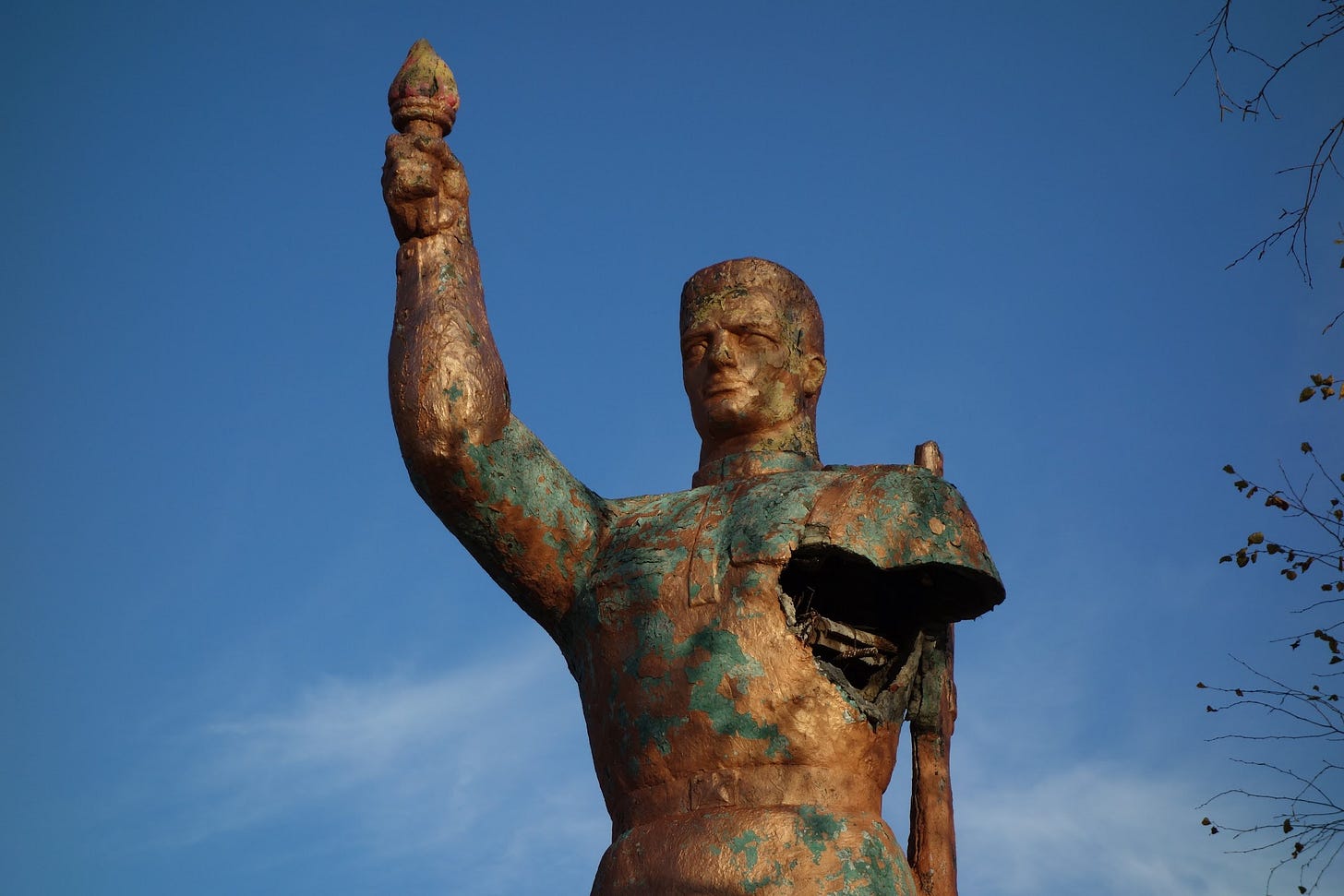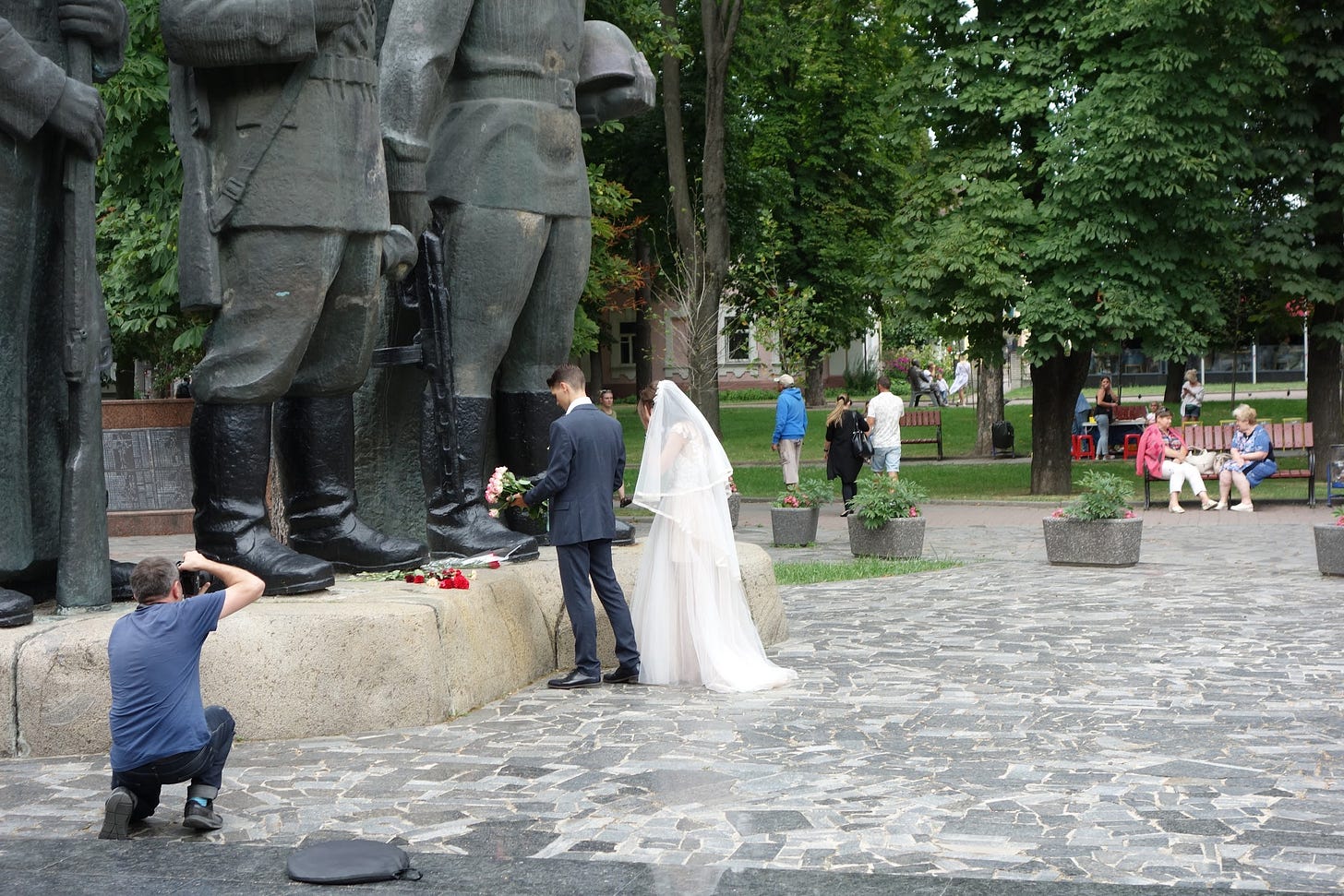Ukrainian Pulse #13
"Our World War 2 narrative is like mixing Pepsi, beer, tea, and a drizzle of oil on top—it may look interesting and mysterious, but it's impossible to drink."
A week ago, Ukraine commemorated the 80th anniversary of the end of World War 2. Those official commemorations were held on May 8, rather than the May 9 date traditional in Russia and most other post-Soviet countries—I don't think readers of this newsletter need an explanation of why this change came about. And yet, symbolically, May 9 still looms large in Ukraine, as does the question of the story that Ukraine should tell itself about its role during World War 2. It’s never been an easy question, and the focus on decommunization and decolonization has made it even more difficult in recent years.
There is usually reluctance to address these issues head-on, which made me all the more intrigued by the headline of this op-ed: “Nation of victors, nation of occupiers, or what is wrong with our narratives about World War 2”.
The op-ed was published both on the author's Facebook page (where it sparked a lively discussion, gathering more than 90 comments) and on Istorichna Pravda, the History-focused page of Ukrainian news outlet Ukrainska Pravda. I'm mentioning this because Istorichna Pravda isn't some fringe publication looking to push alternative viewpoints. It generally upholds a fairly mainstream view of the current historical and memory discussion on Ukraine, making it all the more interesting that it would publish a piece dedicated to the contradictions in that discussion when it comes to World War 2.

Lviv-based teacher and historian Oleksandr Sapronov lists what he sees as five of these contradictions: the focus on Ukrainians who fought outside of the Soviet military, despite this number being dwarfed by the number of Soviet-Ukrainian servicemen; the inability to decide whether the Ukrainian Soviet republic was a Ukrainian state or an occupation regime; the question of whether the outcome of World War 2 should be considered a victory for Ukraine; the question of whether, if Ukrainians in the Soviet military are considered equally Ukrainian as those fighting in the UPA, that period should be considered as a sort of civil war; And the question of what should be done with the memory of Soviet soldiers.
Here is a translated version of the piece, which I’ve tried to shorten as much as possible for this newsletter (it’s still pretty long). As usual, the translation is mostly the work of machines, apologies in advance for any mistakes:
I think about our World War 2 over and over again, and the puzzle just won't fit together in my head. I was on the radio on May 8, talking about the place and role of Ukraine during World War 2, and I realized that I still don't fully know how to talk about it. [...] I constantly feel a sense of cognitive dissonance at the very least, and hypocrisy at the very most.
First—we've been using two different narratives about World War 2, and it seems like everyone's fine with it. Initially and for a long time, we had the concept of the “Great Patriotic War”, which, obviously, was not written by us, and this was a problem. [...] For the last 10 years, we have also been emphasizing that Ukrainians fought not only as part of the Soviet army during World War 2, and it's good to talk about that. We had the UPA, other formations of the resistance movement, there were Ukrainians in the Polish army, in the allied armies—the American, the French, the British.
But, on the other hand, the number of Ukrainians in non-Soviet armies does not even reach half a million, while 6-7 million Ukrainians fought in the Soviet military. The denial of the Ukrainian-Soviet contribution to the victory over Nazism looks a bit strange, at least from a simple mathematical point of view. At some point, a sense began to emerge that the only rightful Ukrainians in World War 2 were those serving in the UPA. All the others were complex, dubious, and not fit to be turned into the heroes that everyone so desperately wanted to find in World War 2.
Second—we still aren't sure what the Ukrainian Soviet Socialist Republic means to us. On the one hand, the Ukrainian SSR emerged as a result of the war with the Ukrainian People's Republic, and, obviously, not without the help of Russian Bolsheviks. Our narrative about the Ukrainian SSR is still quite unambiguous: from 1920 to 1991, Ukraine was under Russian/Soviet occupation. On the other hand, the Ukrainian SSR was legally a Ukrainian Soviet state. At least it had all the external signs of statehood.
Lately, I have been encountering timid voices saying we should speak of the Ukrainian nation in the 20th century as a state, albeit not a sovereign one. A kind of analogue of the Cossack Hetmanate after Mazepa, with external signs of autonomy and subjectivity but no real autonomy. But for some reason, we consider Skoropadsky, Apostol, Polubotko, and Razumovsky to be Ukrainian hetmans, but it is still not fully clear whether Skrypnyk, Rakovsky, Khrushchev, and Shelest headed the Ukrainian Soviet statehood or the occupation administration. Now, a somewhat childish position dominates when it comes to the Ukrainian SSR: everything that was good in the Ukrainian SSR is ours, and everything that was bad is the Russians'. [...]
Third—what does victory in World War II mean to us? Were we defeated, or did we win?
Whenever we talk about a victorious nation, it is worth asking one question: what did this victory give us? Can we really feel the results of this victory? For France or Great Britain, the victory over Nazism is obvious, because these countries can truly say: the victory over Nazism gave us the opportunity to live and develop our countries as independent. What did the victory give to Ukrainians? It's difficult for me to answer. We returned to the same place, to the totalitarian communist union. [...]

Fourth—if we say that Soviet Ukrainians are also ours, why don't we then say that during World War 2 we also had elements of a civil war? If the Ukrainian SSR was an occupation structure, everything is clear. [...] But if the Ukrainians in the Red Army are the same Ukrainians as the Ukrainians in the UPA, then where do we put the facts of the long and brutal struggle of these two Ukraines? We avoid this uncomfortable question and end up with another cognitive dissonance: Soviet Ukrainians expelled the Nazis from Ukraine while simultaneously fighting Ukrainian nationalists. [...]
Fifth—what should we do with the memory of Soviet soldiers? In recent years, our “nation of victors” has been very abstract and impersonal. There is simply a 6-million-strong mass that fought against Nazism. Soviet general officers have long ceased to be Ukrainians, they have been decommunized, like members of the Communist Party. [...] We are ashamed of any name of a Soviet soldier, because it raises many uncomfortable questions. [...]
There are three possible ways to overcome these contradictions. The first is simpler, and we have come closest to it, the second and third are more complex and so far unlikely.
1. We agree that the Ukrainian SSR is not a Ukrainian state, or not a state at all. We say clearly that it is a product of the Russian occupation and that the Ukrainians who served this regime were blind cannon fodder at best and collaborators at worst. But then we will have to abandon the game of being a victorious nation and simply say: we are a victim of two occupations, Nazi-German and communist-Russian.
2. We take responsibility for the Ukrainian SSR and say that Ukrainians are also the creators of this quasi-state entity and were consciously involved in many of its actions. To take at least a little responsibility for the war against the UNR, for the difficulties of industrialization, for anti-religious campaigns and collective farms. Then we could more honestly talk about the victory over Nazism, but this would largely overturn the national narrative of the eternal struggle with Russia.
3. We can try to say that World War 2 for Ukrainians is a combination of a national liberation, civil, and aggressive war. We finally end the black-and-white World War 2, when most of the year our “reds” are occupiers and rapists, and then once a year they become the “nation of victors”. We need to try to explain the Red Army, the UPA, the SS division ‘Galicia’, and the various currents of the resistance movement, without trying to mix them on one plate or to oppose them—because that’s impossible. As a result, World War 2 will end up looking less heroic, or not heroic at all. But it will be more honest.
For a long time, we have been dragged along in the “Great Patriotic War” bandwagon. But now we want, on the one hand, to write the most anti-Russian history of World War 2 (understandably so), while at the same time not falling out of the pan-European collective matrix of “reconciliation and victory over Nazism” (also understandably so).
As a result, our World War 2 is like mixing Pepsi, beer, tea, and a drizzle of oil on top. It may look interesting and mysterious, but it's impossible to drink.




fascinating article, thank you for bringing it to my attention